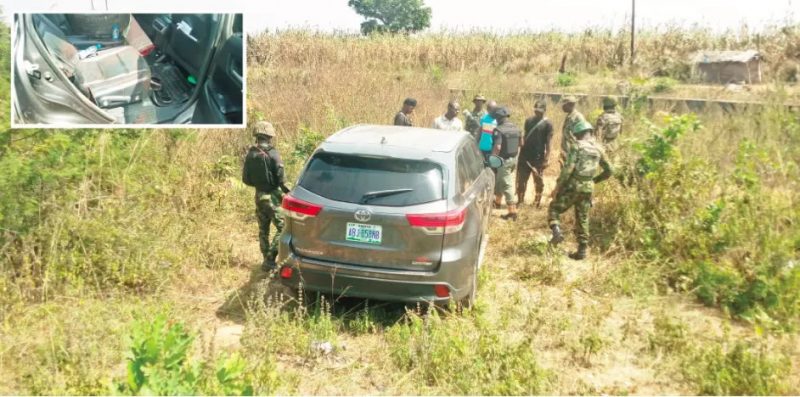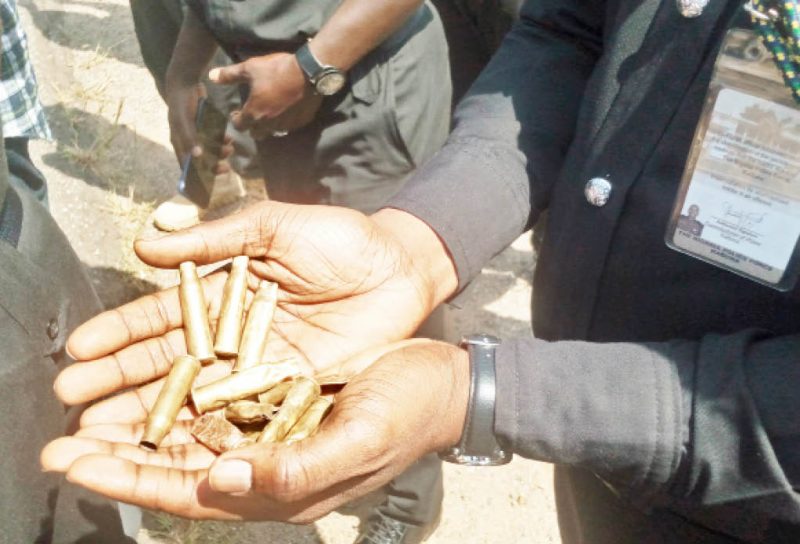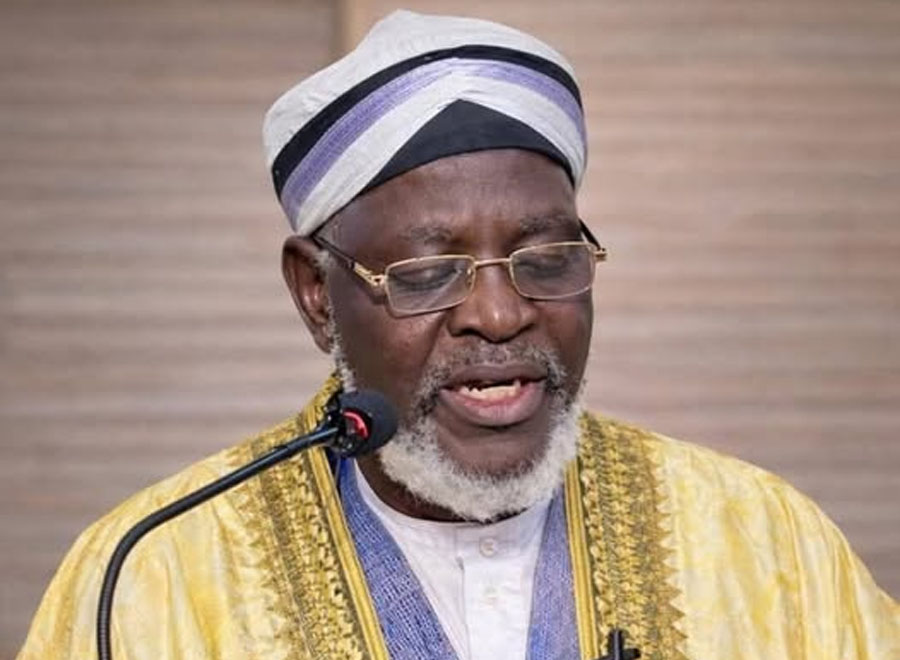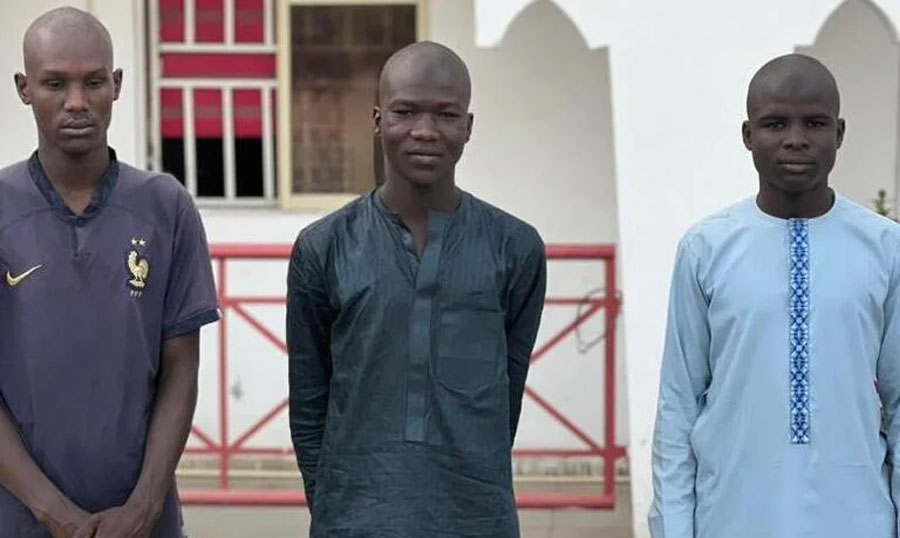metro
Dozens still missing 2 days after Abuja-Kaduna Road attack

Two days after the siege by bandits on the Abuja-Kaduna Highway, many people are still missing, Daily Trust reports.
The Sunday’s attack had claimed the life of a former Director of Protocol in the FCT and a 2019 gubernatorial aspirant in Zamfara State, Alhaji Sagir Hamidu, while many people could not be accounted for.
Minutes after the attack, security operatives, rescue officials and commuters met many vehicles empty at the scene while others veered off the road.
Daily Trust reports that it was the first major attack on the highway since September 14 when bandits attacked the road during which they killed a police officer and abducted the Emir of Bungudu in Zamfara State, Alhaji Hassan Atto, around Dutse village.
Ironically, the kidnappers returned to the highway on Monday after the Sunday’s attack and reportedly abducted many travellers.
READ ALSO:
- Don’t succumb to pressure to release Nnamdi Kanu, Northern Coalition warns Buhari
- Baba Suwe, ace comic actor, is dead (Video)
- WAEC releases 2021 WASSCE with 81.7 per cent pass
Daily Nigerian said that the kidnappers returned to the highway at about 4.30 pm and opened fire on motorists.
It quoted sources saying the incident occurred less than five kilometres away from the point the assailants operated on Sunday.
Lawan Sani, a witness who plied the road immediately after the incident said he saw at least four abandoned vehicles with shattered windshields and flat tyres.
“There was serious commotion and panic around the area. Soldiers arrived at the scene almost immediately but the bandits briskly finished the operation within minutes and disappeared into the bush with many people.
“I saw an 18-seater bus belonging to Zamfara Mass Transit, a Toyota Yaris, a Volkswagen Golf and one other vehicle I could not remember the model. The vehicles were raided with bullets and without their occupants,” Lawan added.
Spokesman for the Kaduna State Police Command, Mohammed Jalige, could not be reached for comment at the time of filing this report.
Making reference to the two incidents in 24 hours, some locals and security experts said the only way to tackle the bandits was to have permanent surveillance along the road.
“We only see active surveillance by security operatives on the highway when a major attack was launched by the terrorists,” said Maikano Ali, a farmer at a village close to Rijana.
“And the operation lasts for just a few days…The security operatives would just disappear and you will only be seeing them from time to time,” he said.

Some bullet shells found on the scene of the attack yesterday
Another villager who did not give his name said the bandits knew when best to attack.
“They take weeks moving on the road, joining other passengers in public transport just to monitor the situation until they are satisfied that the security operatives have relaxed patrol before they would strike,” he said.
Asked about the female soldiers deployed on the road, he said “They are not stationed in one place and you rarely see them also. Maybe they move in plain clothes but the truth is that we need a new approach.”
READ ALSO:
- Imo community pass night in bush as gunmen kill soldiers
- Why we introduced N100bn IBTC infrastructure fund — CEO
- Omoyele Sowore faces fresh arraignment in court on treasonable felony
Two additional APCs deployed
The Commissioner of Police in Kaduna State, Mudassiru Abdullahi, said security agents had rescued 11 victims after Sunday’s attack on the Abuja-Kaduna highway.
He, however, did not give additional details on how the victims were rescued or their identities.
The commissioner said that the security team was re-strategising to ensure the safety of travellers plying the highway.
He recalled that the highway remained safe for about a month until this recent incident.
“We will re-strategise to avoid reoccurrence and we are appealing to travellers not to avoid the Kaduna-Abuja highway,” he said.
Our correspondent, who was at the scene of the incident together with security agents, led by the Kaduna State Commissioner of Internal Security and Home Affairs, Samuel Aruwan, reports that the travellers were ambushed at Kurmin Jama’a (also referred to as Kurmin Kare) in Kachia Local Government Area.
A grey Toyota Highlander vehicle that veered into the bush with an Abuja plate number ABJ-858NB belonging to the late FCT director Hamidu, was still at the scene at 12noon.
The vehicle which was riddled with five bullet holes also had a pair of slippers and bloodstains on the back seat.
Security agents also hand-picked about a dozen bullet shells around the scene before the Toyota vehicle was towed to Katari Police station for safekeeping.
It was learnt that some of the vehicles abandoned on the highway have been moved to police stations while others were retrieved by their owners who succeeded in fleeing into the bushes before they were abducted.
Security agents in pursuit of bandits – Aruwan
Speaking on the incident, Aruwan said that two additional Armoured Personnel Carriers (APCs) have been deployed to Kaduna-Abuja Highway to boost security while also assuring that security agents were in pursuit of the bandits that kidnapped an unspecified number of people.
“As we speak, there is an ongoing joint operation across front line locations in the state, which shows that security forces are up and doing. The security forces and the state government are not resting,” he assured.
He appealed to locals around the Kaduna axis of the road to assist the security agencies with intelligence information to enable them to fight insecurity in the state. On the shortcomings of the telecommunication shutdown, which made contact in terms of distress difficult, Aruwan said the policy was not deliberately aimed at hurting the people but an action taken to enhance security in the state.
“The advantages of the shutdown outweigh the disadvantages,” he said.
How ex-Zamfara gov’ship aspirant was killed – Driver
Opening up for the first time after the incident, Felix Shekari, who is the driver of the former FCT director of protocol and 2019 gubernatorial aspirant in Zamfara State, Alhaji Sagir Hamidu, has narrated to Daily Trust how the bandits opened fire on their vehicle.
He said the bandits appeared from the bush around 3.30 pm shooting sporadically.
Shekari said their escort pilot vehicle was behind them while other vehicles were driving ahead of them.
He said, “I saw some vehicles in front of us trying to make a U-turn and I immediately tried to turn also to go back to Kaduna but as I turned, four gunmen appeared in front of us and opened fire at our vehicle.
“They were targeting me and the tyre and when I realised that I couldn’t beat them, since the vehicle is not bulletproof, I veered off the road into the bush. I unlocked the seat belt and ran into the bush.
“I don’t want to be kidnapped and so, I crossed to the other lane into the bush and took cover at a nearby village for 40 minutes during which I heard numerous gunshots.”
Shekari, however, said even though the bandits had opened fire on their vehicle, he was not aware that his boss was shot until almost an hour later when he returned to the scene and found Alhaji Hamidu in the pool of his blood.
He said they rushed the victim to a private hospital in Katari where he was given first aid and then moved him to Abuja where he died. He said the late Hamidu was shot in the chest and his leg and had lost a lot of blood.
The driver, who was still in distress when our correspondent communicated with him, said the bandits wore facemasks and were in military camouflage. He described his late boss as a very good man saying his death was a great loss not only to his family but the country.
Another relative who spoke with Daily Trust said the late Hamidu was travelling with another person in the vehicle who is suspected to have been abducted.
“They were three in the car including the driver. The driver escaped, Alhaji Sagir Hamidu was killed and the other person is nowhere to be found,” he said.
Synergy key to ending attacks- Analyst
Dr Awwal Abdullahi Aliyu, a security analyst said the solution to the incessant attacks on the highway lies in coordination and cooperation among the various security agencies and not in their numbers.
Dr Aliyu told Daily Trust that the fact that several security agencies were policing the road and yet the bandits were still carrying out daring attacks showed that the strategy in handling the situation was not working.
He said, “I think there is the need for a very serious intelligence network within that area.
“I am not saying the security agencies are not working, but I think their strategy is not working and it is not in any way near solving the problem as at this moment,” he said.
He said apart from working together, the security agents must deploy drones and have some agents embedded in communities.
On shutting down telecommunication along the Kaduna-Abuja Highway, the analyst said, “The idea behind the network disconnection was to help in curtailing the security challenges, but it seems not to be working the way it is expected because the bandits have realised that it is even easy for them to conduct an operation and leave before the incident is reported to security agents.”
Daily Trust reports that there were at least five security operations and outfits deployed to the Kaduna-Abuja Highway but sources said they were working at cross purposes.
In January 2021, the Kaduna State government received the first batch of 100 female soldiers deployed by the Nigerian Army soldiers from the 1 Women Special Operations Battalion to boost security situations along the highway. It is, however, uncertain if the remaining 200 female soldiers were later deployed.
The Nigerian Army had during the deployment said the female soldiers were expected to complement Operation Thunder Strike and other existing operations along the highways and the environs.
Others outfits deployed on the road include men of the Special Task Force and the Police Intelligence Response Team.
When contacted last night, the spokesman of the Nigerian Army, Brig.-Gen. Onyema Nwachukwu maintained that troops have not at any time been withdrawn from Abuja-Kaduna highway.
Although the senior military officer told one of our correspondents via telephone that the personnel were always on patrol on the road, he promised to find out more information and get back to Daily Trust.
“I think troops are deployed there. I am sure that troops are deployed along that road. Troops are always on patrol along that road,” Nwachukwu said while replying to Daily Trust’s inquiry.
Efforts to reach Force Public Relations Officer, Frank Mba, proved abortive as calls placed on his mobile phone were rejected.
Daily Trust
metro
Court Orders DIA to Produce Cleric Accused of Coup Plot by February 18

Court Orders DIA to Produce Cleric Accused of Coup Plot by February 18
A Federal High Court in Abuja has directed the Defence Intelligence Agency (DIA) to produce Sheikh Sani Abdulkadir Zaria, an Islamic cleric accused of plotting a coup against President Bola Tinubu’s government, before the court on February 18, 2026. The order follows a fundamental rights enforcement suit filed on behalf of the cleric challenging the legality of his detention.
Justice Peter Lifu emphasised that in a democratic society, all security and intelligence agencies are subordinate to civil authority, noting that every citizen is entitled to protection under Sections 36(1), (5), and (6) of the 1999 Constitution. He also reminded authorities that Nigeria’s commitments to international human rights conventions require strict adherence to lawful detention procedures.
READ ALSO:
- End of Weekly Shutdown: Igboho Advocates Negotiation to Resolve Kanu’s Legal Battle
- NELFUND Refutes UniAbuja Loan Diversion Claims
- NRC, Entertainers Finalise Plans for 2026 Valentine Train Ride
The suit, filed by Sheikh Zaria’s legal team led by Sunusi Musa (SAN), Abdul Aliyu (SAN), and Mohammed Sheriff, names the DIA, the Economic and Financial Crimes Commission (EFCC), the Attorney General of the Federation and Minister of Justice, and Jaiz Bank Plc as respondents. The lawyers are seeking either the cleric’s release or an explanation for his continued detention.
During Thursday’s hearing, DIA counsel I.O. Odom Esq informed the court that the cleric was being held on behalf of the Defence Headquarters, but could not provide a valid detention order. The EFCC’s counsel, M.C. Odimbaiwe Esq, supported this position. Justice Lifu adjourned the matter and set February 18 for the DIA to produce Sheikh Zaria or justify his detention, warning that failure to do so could influence the outcome of the rights enforcement case.
Family sources linked Sheikh Zaria’s detention to an ₦2 million gift sent to the cleric’s account by an adherent connected to a suspect in the broader coup allegation. Since December 11, 2025, the cleric has reportedly been held in “safe custody” without access to family or associates, prompting his lawyers to argue that his fundamental rights have been violated.
The case underscores ongoing concerns about civil liberties, human rights, and lawful detention in Nigeria, particularly in high-profile national security investigations. The court’s ruling will be closely watched as it addresses the balance between state security and individual rights.
Court Orders DIA to Produce Cleric Accused of Coup Plot by February 18
metro
End of Weekly Shutdown: Igboho Advocates Negotiation to Resolve Kanu’s Legal Battle

End of Weekly Shutdown: Igboho Advocates Negotiation to Resolve Kanu’s Legal Battle
Yoruba nation activist, Chief Sunday Adeyemo, popularly known as Sunday Igboho, has called on the detained leader of the Indigenous People of Biafra (IPOB), Nnamdi Kanu, to engage in constructive dialogue with the Federal Government following the formal end of the controversial Monday sit‑at‑home directive across the South‑East region.
In a statement issued on Friday by his legal counsel, Pelumi Olajengbesi, Igboho applauded Kanu for suspending the weekly protest, which had disrupted economic and social activities in the region for over five years. The directive, first introduced in August 2021, led to periodic shutdowns of markets, offices, schools, and transport services, severely affecting local businesses and daily life.
Describing the suspension as a “thoughtful and necessary” step, Igboho noted that ending the sit‑at‑home signals a shift toward constructive engagement and could help restore stability and economic normalcy in the South‑East. He said the move represents the conclusion of a five-year period of economic disruption that has hampered growth and development in the region.
READ ALSO:
- NELFUND Refutes UniAbuja Loan Diversion Claims
- NRC, Entertainers Finalise Plans for 2026 Valentine Train Ride
- 2027 General Elections: INEC Announces February 20 for Presidential Poll
Beyond applauding the abolition of the civil disobedience measure, Igboho urged Kanu to adopt a conciliatory approach, opening channels for mediation and negotiation with the Federal Government. He emphasised that sustained dialogue could help break the deadlock surrounding Kanu’s legal battle and potentially pave the way for a political resolution to longstanding grievances.
Igboho also warned that those who profit from the destabilisation and violence in the South‑East should desist, highlighting the importance of peace for the economic recovery and prosperity of the region and the nation at large.
“This is a critical moment for the South‑East. True progress depends on dialogue, compromise, and the willingness of all parties to engage constructively,” the statement read. Igboho’s remarks reflect a growing call among activists and stakeholders for peaceful resolution and collaboration to ensure lasting stability in the region.
The end of the Monday sit‑at‑home has been welcomed by several civil society groups and business leaders, who view it as a key step toward restoring normalcy, resuming commerce, and promoting social cohesion in the South‑East.
End of Weekly Shutdown: Igboho Advocates Negotiation to Resolve Kanu’s Legal Battle
metro
EFCC Nabs Three in Borno Over Viral ₦500 Naira Mutilation Video

EFCC Nabs Three in Borno Over Viral ₦500 Naira Mutilation Video
The Economic and Financial Crimes Commission (EFCC) has arrested three suspects in Maiduguri, Borno State, over alleged naira mutilation following a viral social media video showing them misusing the Nigerian currency.
In a statement issued on Thursday by its Head of Media and Publicity, Dele Oyewale, the anti-graft agency disclosed that the suspects — Adam Muhammad, Muhammad Muhammad, and Bashir Musa — were apprehended by operatives of the EFCC’s Maiduguri Zonal Directorate.
READ ALSO:
- Omokri Accuses El-Rufai of Rights Abuses During Kaduna Governorship
- Lagos Motor Fair, Autoparts Expo to begin March 17, targeting Investment, Industry Growth
- First Daughter of Murtala Muhammed Reflects on Life Without Father, Preserving His Legacy
According to the commission, the trio was seen in a widely circulated video cleaning mucus from their noses using ₦500 naira notes, an act described as abuse and defacement of the national currency.
The statement said the suspects were traced and arrested within the Maiduguri metropolis shortly after the video surfaced online and triggered public reactions.
They are currently being held at the EFCC’s Maiduguri detention facility while investigations continue. The commission added that the suspects would be charged to court upon the conclusion of investigations.
Under the Central Bank of Nigeria (CBN) Act, abuse, defacement, spraying, or improper handling of the naira constitutes an offence punishable under Nigerian law. The EFCC has in recent months intensified its crackdown on cases involving naira abuse and currency mutilation across the country.
The latest arrest underscores the agency’s renewed enforcement drive aimed at protecting the integrity of Nigeria’s legal tender.
EFCC Nabs Three in Borno Over Viral ₦500 Naira Mutilation Video
-

 metro1 day ago
metro1 day agoIKEDC Sets Feb 20 Deadline for Customers to Submit Valid IDs or Face Disconnection
-

 Education1 day ago
Education1 day agoSupreme Court Affirms Muslim Students’ Right to Worship at Rivers State University
-

 metro21 hours ago
metro21 hours agoLagos Police Launch Manhunt for Suspect in Brutal Ajah Murder
-

 Business3 days ago
Business3 days agoDangote Refinery Slashes Petrol Price to ₦774, Ends PMS Bonus Window
-

 News22 hours ago
News22 hours agoAso Rock Goes Solar as Tinubu Orders National Grid Disconnection
-

 Business2 days ago
Business2 days agoNaira Could Trade Below ₦1,000/$ With Dangote Refinery at Full Capacity — Otedola
-

 metro3 days ago
metro3 days agoKwara, Katsina Bloodshed: TMC Condemns Attacks, Dismisses ‘Jihadist Preacher’ Claims
-

 metro1 day ago
metro1 day agoArmy University Professor Dies in Boko Haram Captivity After Nearly One Year















